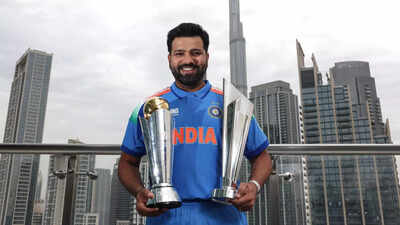The Men’s 2023 ODI World Cup has reached the semi-final stage in the race to play the final on November 19. Here we will round up the latest action and news from the event and bring you the insights from our reporters on the ground.
—
Match preview: India vs New Zealand, Mumbai (2pm IST; 8.30am GMT; 7.30pm AEDT)
The unstoppable force and the shape-shifting object
India are having the World Cup of their wildest dreams and it has nothing to do with the fact they are undefeated in it. That is merely a byproduct of their planning leading into the tournament. They left 2019 needing… more. So they went out searching, trying as many as 50 different players across four years and 66 matches. Six months out from the showpiece, they had identified who they wanted and were focused on sharpening their skills. In the 15 ODIs between March and October 2023, they were picking all of their XIs from a set of 24.
Expect a cagey start. Each team trying ever so hard not to make the first mistake, trying not so much to beat the opposition as outlasting them. New Zealand are masters at this art; at just staying in the game long enough until there is an opening to burst through.
Team news
India (probable) 1 Rohit Sharma (capt), 2 Shubman Gill, 3 Virat Kohli, 4 Shreyas Iyer, 5 KL Rahul (wk), 6 Suryakumar Yadav, 7 Ravindra Jadeja, 8 Mohammed Shami, 9 Kuldeep Yadav, 10 Jasprit Bumrah, 11 Mohammed Siraj
New Zealand (probable) 1 Devon Conway, 2 Rachin Ravindra, 3 Kane Williamson (capt), 4 Daryl Mitchell, 5 Tom Latham (wk), 6 Glenn Phillips, 7 Mark Chapman, 8 Mitchell Santner, 9 Tim Southee, 10 Lockie Ferguson, 11 Trent Boult
Feature: Jasprit Bumrah is a species of exactly one
If you have seen him, then immediately you understand that the tone he has set at the start of an innings is as unforgiving as McGrath used to set. Forget scoring, how is one expected to survive this?
Tactics board: Don’t lose the game inside the first 15 overs
Must Watch: Aaron Finch on how Australia know how to win
News headlines
Semi-final build-up: There’s no denying David Warner’s an ODI GOAT
Among all the ODI greats Australia has produced, Warner stands head and shoulders above them, with the lack of matches he has played only further highlighting his extraordinary output. And in World Cups, when the pressure is at its greatest, he has elevated his performance to a level that only the very elite have achieved.
Mark Nicholas: In South Africa’s quest for the future, there’s no room for heartbreaks of the past
To understand this fully, you have to revisit three scoreboards. The first, at the Sydney Cricket Ground in 1992, which read “South Africa to win need 22 runs off 1 ball”. Ridiculous – blame the mathematicians. Though South Africa’s slow over rate had tipped the equation so firmly in England’s favour.
The second, at Edgbaston in 1999, when just one run was required off the final four balls of the match with the unbeaten player of the tournament, Lance Klusener, on strike. More of that in a minute.
The third, at Kingsmead in Durban in 2003 – which, to be fair to the South African protagonists, was a tight Duckworth-Lewis job – showed one run required off one ball when the batters in the middle thought none were required of one ball.





